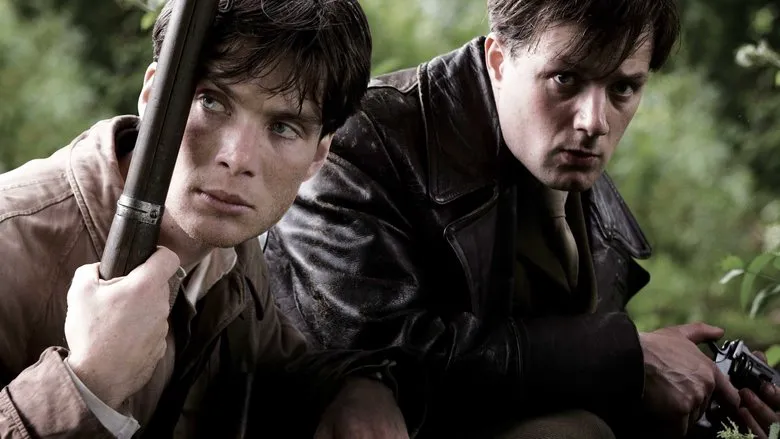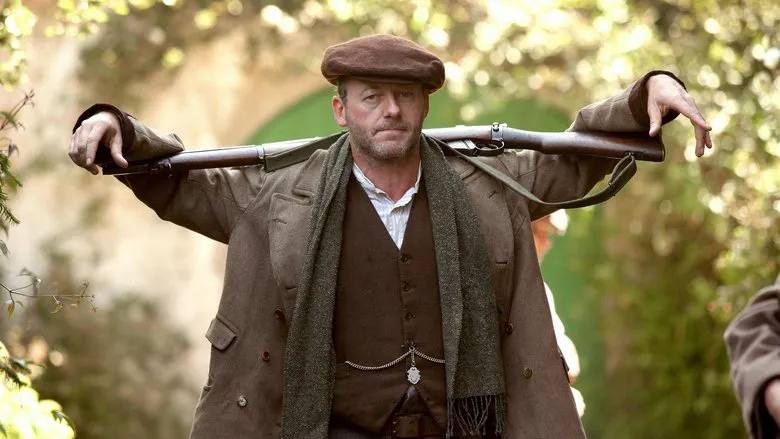A Bitter Wind: Ken Loach’s “The Wind That Shakes the Barley”
It might have been better if they’d stuck that Palme d’Or somewhere else. At 70, veteran British director Ken Loach ventured into Irish history with “The Wind That Shakes the Barley.” It’s not the first time he’s seemed to prioritize subject matter over nuanced storytelling, and his age shouldn’t excuse this. In fact, at this stage in his career, shouldn’t he be focusing on deeper truths instead of exploiting sensitive topics?

Loach’s film, set in 1920, depicts the Irish struggle for independence against British rule. The film opens in a picturesque village where neighbors and relatives are enjoying a game of hurling. Suddenly, British soldiers arrive, rounding everyone up and behaving aggressively. The commanding officer, without provocation, escalates the situation to a near-caricature of hysteria. When one of the Irishmen identifies himself as “Mícheál” (pronounced in the native Gaelic), the commander orders his arrest. Soon after, the man’s body is found in a barn, riddled with bayonet wounds.
While British atrocities undoubtedly occurred as they struggled to maintain their colony, Loach seems intent on exaggerating and manipulating emotions from the outset. The narrative then shifts to internal conflict among the Irish. One of them, Cillian Murphy’s character, is a doctor on the verge of leaving for London to train at a prestigious clinic. He has no desire to fight. His fiancée disapproves, but he still attempts to leave. However, witnessing further British brutality at the train station, he changes his mind, joins the underground resistance, and undergoes a dramatic transformation. Because he is “smart,” as everyone says, he commits fully to the cause, even surpassing his own brother in zeal. He is ultimately tasked with the grim responsibility of executing traitors – a “strategy for victory.” The crux of the matter is that in 1921, Southern Ireland achieved a degree of independence, becoming a dominion. But the rebel leaders immediately fell into infighting, divided between those who sought complete independence and those who were willing to settle for the compromise.
Simplistic Patriotism
The film avoids getting bogged down in complex political details, focusing instead on the human element. The cinematography is decent, capturing the beauty of the Irish landscape, and the acting is engaging (Cillian Murphy is a stark contrast to his character in “Breakfast on Pluto”). However, the film’s central message, hammered home through these personal stories, boils down to the tired cliché that “politics is a dirty game.” The plot is cyclical, with the ending mirroring the beginning, but with reversed roles. The British behaved like brutes, but the Irish often followed suit. The doctor’s story is overly melodramatic. He sacrifices his medical talent for his brother and the revolution, only to become his brother’s enemy and be consumed by the revolution. His only solace is the brief return of his fiancée as his wife. And the blame is placed on vague “Forces of Hostility,” “Ethnic Conflicts,” and “Political Powers” that engulf individuals and spit them out as corpses. “It was a different time,” the film seems to say. “Let’s all just get along.”

A Rehashed Narrative
Do we really need to be told this again? Especially in a country that has marched in lockstep with revolution for an entire century. Nikolai Nechayev wrote his “Catechism of a Revolutionary” a century and a half ago, and Dostoevsky penned “Demons” shortly after. Ken Loach is simply reinventing the wheel at 70. While this might resonate with British, French, Chinese, or anyone who has experienced revolution, it’s a particularly hard sell here. The film’s sentimentality is trite and tiresome. But what Loach fails to realize is that “The Wind That Shakes the Barley,” with its heavy-handed melodrama, exposes its own inherent falseness. The unintentional truth of the situation is far more complex.
He killed a crow with a slingshot and wept with self-pity.
He beat a dog to death with a stick and wept with self-pity.
He shot a wealthy Englishman and wept with self-pity.
He shot a young farmhand for “treason” and wept with self-pity.
Then he visited the mothers and wives of the slain, delivered their farewell letters, led them to freshly dug graves, and when they rejected him, he wept, wept, wept with self-pity.
After all, he wasn’t to blame: he had orders, a commander, a decision from the political council, the party cell, his comrades in arms. It wasn’t him who killed – it was the political council or “we” all together. Of course, he knew he was “crossing a line,” especially if he was an intellectual like the “doctor.” But what else could he do?

This is the story the film tells, simply changing His face at each execution. The essence remains the same: as soon as He gets his hands on a weapon, He will kill, and the Forces of Hostility, Political Powers, and Ethnic Conflicts will take the blame, because it wasn’t Him, it was them who decided everything for Him.
So weep with Him, weep like Him, weep better than Him. Ugh, disgusting.